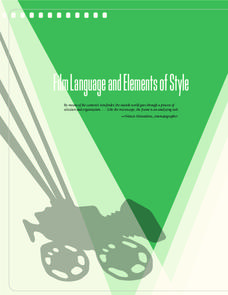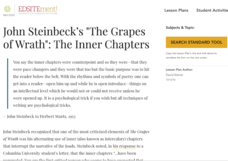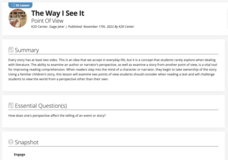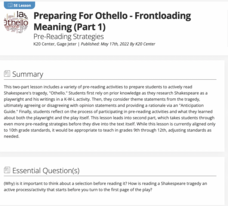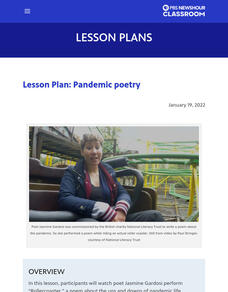Curated OER
A Study Guide for The Phantom of the Opera
Immerse yourself in the beautiful, twisted world of Andrew Lloyd Webber's The Phantom of the Opera. A detailed lesson plan provides important details about the writing, stagecraft, music, and literary elements of the famous musical,...
Federal Reserve Bank
It's Your Paycheck
Beyond reading and arithmetic, one of the most important skills for graduating seniors to have is fiscal literacy and responsibility. Start them on the right financial track with nine lessons that focus on a variety of important...
Illinois State Board of Education
Common Core Teaching and Learning Strategies
Here's a resource that deserves a place in your curriculum library, whether or not your school has adopted the Common Core. Designed for middle and high school language arts classes, the packet is packed with teaching tips, materials,...
Waunakee Community School District
Identifying Themes in Literature
If your language arts learners have a hard time determining the universal theme of a written work, use a straightforward instructional activity to help them find it. After reviewing a list of common themes, kids note the title,...
Scholastic
Reading Characters
Philip Pullman's The Golden Compass provides the text for a study of how writers bring characters to life. Using the provided character mapping worksheets, readers respond to questions and then write a short character sketch.
Common Sense Media
Private Today, Public Tomorrow
What responsibility do we have to protect the privacy and safety of others when posting information about them online? This is an essential activity for every learner today experiencing their social and professional worlds in an online...
Film Foundation
Film Language and Elements of Style
How do you read a frame? How do you read a shot? Here's a resource that shows viewers how to read films. As part of the study, class members examine the camera angles, lighting, movement, and cinematic point of view in Mr. Smith Goes to...
Film Foundation
Mr. Smith Goes to Washington: What Is a Movie?
Watching is not the same as seeing. Transform viewers from passive watchers to active students of film with this 34-page packet, filled with lessons and activities that use Mr. Smith Goes to Washington to examine the technology, the...
Federal Reserve Bank
“W” Is for Wages, W-4 and W-2
Don't let your young adults get lost in the alphabet soup of their paychecks and federal income taxes. Using sample pay stubs and reproductions of government forms, your class members will identify the purpose of such forms as a W-4 and...
Sharp School
Horror Fiction Multimedia Project
"There comes an end to all things" and ending a study of horror fiction with a multimedia project is "like starting a stone. . . away the stone goes, starting others. . ." In this case, groups start with a question generated by Dr....
National Endowment for the Humanities
John Steinbeck’s "The Grapes of Wrath": The Inner Chapters
Here’s a must-have resource for anyone using The Grapes of Wrath. Everything from guiding questions to background information, from photographs to documentary films, from activities to assessments is included in a richly detailed packet...
National Endowment for the Humanities
Courage “In the Time of the Butterflies”: A Common Core Exemplar
The courage of Las Mariposas, the Mirabal sisters, is the focus of a series of activities designed to accompany a reading of In the Time of the Butterflies that ask readers to consider what it means to be courageous. Beautifully crafted...
US National Library of Medicine
Frankenstein: Penetrating the Secrets of Nature
Just because you can, should you? Reflections on the ethics and limits of medical research are prompted by a reading of excerpts of Mary Shelley’s Frankenstein, viewing of clips from the 1931 film, and examining sections of the online...
Southern Nevada Regional Professional Development Program
Reading Literature - Romeo and Juliet
“What is the theme of this story?” Now there’s a question all pupils dread. Rather than encountering a sea of faces that look like they were painted by Edward Munch, face a classroom filled with smiles and confidence. Show your readers...
Shakespeare Uncovered
Henry IV, Part I: Does Father Know Best?
“Yea, there thou mak’st me sad and mak’st me sin/In envy that my Lord Northumberland/Should be the father to so blest a son--.” Henry IV, Part I, provides the text for a series of exercises that ask class members to examine the...
The New York Times
Stress Less: Understanding How Your Mind and Body Respond to Anxiety
What could be more relevant to teens and preteens than experiencing stress? Use an article from the New York Times website to practice valuable Common Core skills for informational text reading, and also get a discussion going in your...
Curated OER
Marching to the Beat of a Different Drum
Henry David Thoreau and Linda Ronstadt? Ann Tyler and Pete Townshend? Joyce Carol Oates and Pearl Jam? This richly detailed plan pairs classic literature with contemporary music and asks learners to analyze how the theme of conformity is...
K20 LEARN
The Way I See It: Point of View
Robbers see a house from a different perspective than real estate agents. That's the big idea in a lesson about point of view. Groups assume the role of either robbers or real estate agents, note important details in a description of a...
K20 LEARN
Preparing for Othello - Frontloading Meaning (Part 1): Pre-reading Strategies
The success of any lesson based on a complex text relies heavily on what instructors do before beginning the reading. Before reading Othello, scholars engage in a series of pre-reading activities, including completing an anticipation...
K20 LEARN
The Eyes of Dr. T. J. Eckleburg: The Great Gatsby and the Sense of Sight
To conclude a study of The Great Gatsby, class members create a multimodal project that represents what they feel the eyes of Dr. T.J. Eckleburg see about the hidden side of one of the characters in F. Scott Fitzgerald's classic...
National Endowment for the Humanities
Navigating Modernism with J. Alfred Prufrock
Learners explore the role of the individual in the modern world by closely reading and analyzing T.S. Eliot's "The Love Song of J. Alfred Prufrock."
Common Sense Media
My Online Code
Approach ethical online behavior with a series of activities geared toward teaching pupils about digital citizenship. After a brief discussion about ethics, small groups inspect a fictional social networking profile with ethics in mind....
National Endowment for the Humanities
Man and Superman
Ordinary and extraordinary readers will find much to contemplate in a activity on Crime and Punishment as they examine the dichotomies in Dostoevsky's novel. Scholars reflect on Raskolnikov's theory that extraordinary individuals are not...








